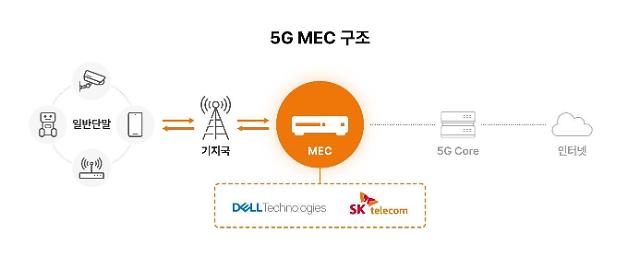
[Courtesy of SKT]
The MEC technique uses small-sized data centers set up around the edge of a physical 5G wireless network. Instead of communicating with base stations or communication hubs that are kilometers away, a MEC system creates a data shortcut between a mobile device and the nearest base station to reduce latency.
Maintaining a low-latency state is vital for any wireless communication system because if the latency is high, it may cause data lag and slow down the network. A MEC system distributes computing load to data centers and speeds up the data processing speed of networks. It is vital for smart factories, smart farms and other smart facilities hooked onto a 5G network to utilize the MEC technique to ensure fast data transferring speed.
The global market for MEC is projected to reach $2.8 billion in 2027, according to global market research firm Meticulous Research.
SK Telecom (SKT) and Dell Technologies collaborated to release "Petasus," a 5G MEC solution. Petasus is a hybrid of SKT and Dell's technologies and uses SKT's MEC technique through Dell's servers. SKT said that the new MEC solution can be integrated with other MEC solutions created by different companies.
While targeting global telecom companies as their main customer group, the two companies will also seek individual businesses and institutions that require private 5G networks. Normally, smart factories and smart farms do not use commercial 5G networks for the operation and management of equipment. Such facilities use a dedicated 5G network that provides just enough coverage to connect equipment to their control tower.
"Our collaboration with SKT gives enterprises the capability to quickly act on data at where it resides, at the edge, to deliver better business outcomes," Dell Technology's senior vice president Dennis Hoffman said in a statement on March 28.
Copyright ⓒ Aju Press All rights reserved.





View more comments